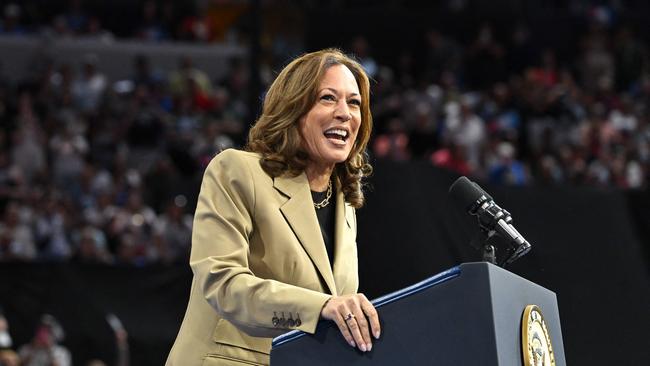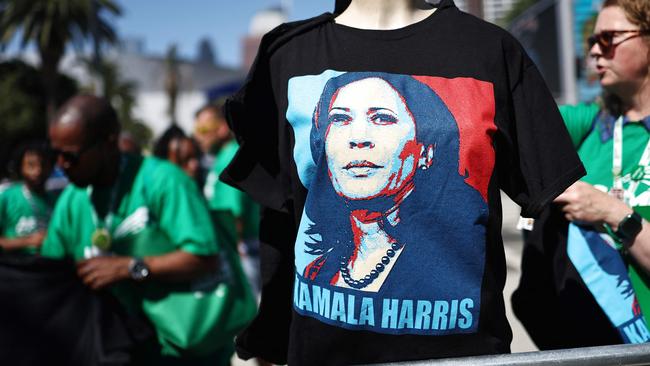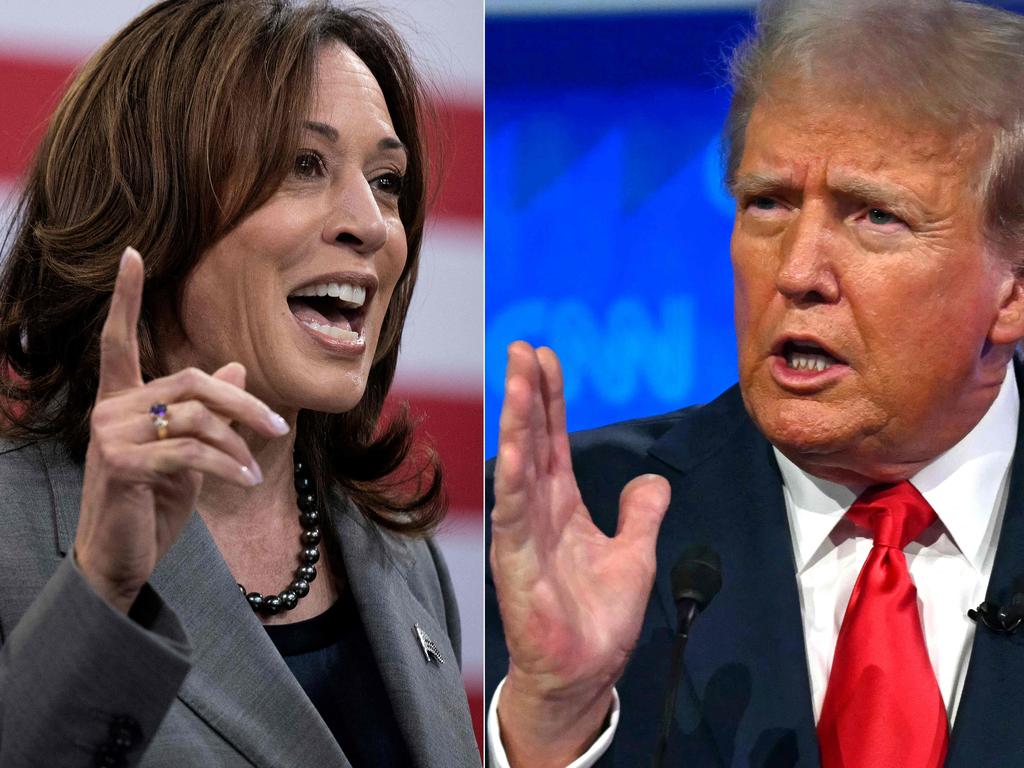Who is Kamala Harris? Voters are none the wiser
If Kamala Harris’ poll momentum were to last another 80 days, she would enjoy a thumping victory over Donald Trump. But it almost certainly won’t – because her biggest test still lies ahead.

In just four weeks, the new Democratic candidate has up-ended the contest with Republican Donald Trump, starting off as a clear underdog, then drawing level and now leading the former president in the polls and the betting markets.
When the four-day Democratic National Convention starts on Tuesday AEST in Chicago, Harris’s campaign will be further turbocharged by a choreographed festival of Kamala as her rise is celebrated by the Obamas, the Clintons and other Democrat royalty. At this point in the election cycle, with 80 days to go, almost everything is falling the way of the 59-year-old Vice-President.

Harris has been embraced by Democrats and by many independent voters who cannot hide their glee about the replacement of the doddery Joe Biden with a younger, more charismatic candidate.
A Monmouth University poll this week found voter enthusiasm among Democrats has soared from 46 per cent in June under Biden to 85 per cent now with Harris as their candidate. Fundraising records have been broken as donors, big and small, embrace her campaign. The polls suggest that Harris is winning over women, black voters and younger voters in the battleground states at Trump’s expense.
Her selection of folksy white midwesterner Tim Walz, the Minnesota Governor, as her vice-presidential running mate has proved popular with voters. The US media also has given Harris a dream run as if it, too, is relieved to have a more vibrant contest than a Biden-Trump rerun. A regal-looking portrait of Harris graces the cover of Time Magazine this week with the words “Her moment”.

If this momentum were to last another 80 days Harris would enjoy a thumping victory over Trump. But it almost certainly won’t because her biggest test still lies ahead.
So far Harris has managed to surge to the lead in the polls and generate enormous enthusiasm without subjecting herself to a single interview. As such, voters still know almost nothing about her agenda, her policies and about what sort of president she would be.
This has been a deliberate strategy by her campaign team, which knows that the downsides of serious media scrutiny via in-depth interviews are greater than the upsides of large feel-good rallies.
As one unnamed Democrat congressman told Politico: “Why would we start talking about policy? We’re actually better off just running on this real wave of enthusiasm and energy … it’s the best thing (Harris) can do.”
But this sort of policy avoidance is unsustainable for the entire duration of a presidential election campaign and already the calls are growing for Harris to explain what sort of president she would be.
Even the left-leaning Washington Post in an editorial this week called on Harris to be more accountable, saying: “If she hopes to prevail, Ms Harris needs to present her ideas. The media and public have legitimate questions, and she should face them. Without hearing Ms Harris articulate her thought process, she runs the risk of leaving voters to wonder whether she is just shifting with the political winds or, indeed, planning to revert to previous positions after she’s won the presidency.”
For example, Harris’s campaign says she no longer supports some of her previous positions such as a ban on fracking, or the elimination of private health insurance, or claiming, as she did in 2019, that those who crossed the border illegally should not be charged with a crime.
She previously has expressed sympathy for the “defund the police” movement sparked by the 2020 murder of George Floyd by a Minneapolis police officer and backed the need to “critically examine” the role of US Immigration and Customs Enforcement, which at that time was seen as being too harsh on illegal immigrants.
The key moment for her campaign will be how she handles the inevitable questions about why she has changed these liberal views and what she now believes in.
In particular, Harris will have to defend and explain the weakest parts of the Biden-Harris record such as the failure of border security and the high cost of living.
There won’t be a reality check on Harris immediately – the Democratic lovefest of next week’s party convention will extend her honeymoon for another few weeks.
Yet Harris knows she is under pressure to be more accountable to voters and she has promised she will have a sit-down interview before the end of the month, if only because the Trump campaign is now exploiting her refusal to face scrutiny.
She also will face Trump in at least one televised debate, on September 10. So far Harris has attacked her 78-year-old opponent as a threat to democracy and a throwback to the past who would impose draconian limits to abortion and voting and attack US institutions. But Harris cannot win by simply attacking Trump. She needs to explain her own agenda.
If Harris stumbles in her first major interviews or in the debate, it would quickly puncture her honeymoon and allow Trump to come roaring back into the race.
But the truth is that no one knows how long the Harris honeymoon can last, in part because the circumstance of her becoming the candidate at such a late stage in the election cycle means there are no precedents for such a truncated campaign. Her honeymoon has flourished now for almost a month since Biden abandoned the race on July 21 but there are still 2½ months to go, which is more than enough time for momentum to shift.
The most detailed poll so far since Harris became the candidate, a New York Times/Siena poll, was released this week. It showed Harris leading Trump 50 per cent to 46 per cent in the three “blue wall” battleground states of Michigan. Wisconsin and Pennsylvania. If Harris won these three states she would win the election.
Previously, Trump had enjoyed a narrow lead over Biden in each of these states.

The poll shows Harris leads Trump comfortably on the issue of who is more trusted to handle abortion (58 to 37 per cent) and protect democracy (54 to 42 per cent). It also shows a surge in support for Harris from younger voters with her approval rating among 18 to 29-year-olds jumping from 33 per cent to 49 per cent.
But a closer look at the poll suggests Harris still faces a significant challenge in persuading voters that she is a better choice on some key hot-button issues.
For example, she lags Trump on the question of who would be better at managing the border (Trump leads 51 to 46 per cent) and the economy (Trump leads 52 to 46 per cent). The poll also shows that 42 per cent of voters think Harris was too liberal, suggesting Trump is hitting the mark with his claim that she is a radical San Francisco liberal. But how liberal will Harris mark II be?
The little that we know suggests she is trying to chart a more centrist course than she did during her failed presidential run in 2019. For example, she has abandoned some of her previous leftist positions from fracking to illegal immigrants that she held in 2019.
But as a Vice-President who has embraced Biden’s policies, Harris has only limited room to carve out a different set of policies without being disloyal to Biden and his record.
So far Harris has given only feel-good speeches that focus on a “fight for the future” on behalf of “middle-class Americans” but she has given no indication of her key policies.
On border security Harris appears to be trying to become a tougher version of her previous self, telling a crowd in the southwestern border state of Arizona this week that she would fight for “strong border security”.
“We know our immigration system is broken and we know what it takes to fix it: comprehensive reform. That includes strong border security and an earned pathway to citizenship,” Harris said.

A new Harris campaign ad states “as president she will hire thousands more border agents and crack down on fentanyl and human trafficking. Fixing the border is tough. So is Kamala Harris.”
Harris now says “unauthorised border crossings are illegal” and she has backed the tougher stance, belatedly introduced by Biden in June that disqualifies migrants from winning asylum if they enter the US illegally.
That policy, introduced by Biden to try to quell criticism of his lax border management, has helped sharply reduce the number of illegal crossings of the US-Mexico border with just 57,000 reported in July, down from a record 250,000 in December last year. But the border, alongside the cost of living, remains Harris’s biggest electoral liability. She was with Biden every step of the way when he dismantled some of the hardline border policies of Trump in 2021, allowing the subsequent flood of more than 10 million undocumented migrants to cross the border.
Polls show that border security ranks second only to inflation as the most important issue for voters. Trump has, somewhat inaccurately, dubbed Harris the “border czar” because she was charged as Vice-President with trying to solve the root causes of migration from three Central American countries.
But even though Harris has not been directly responsible for the flood of illegal migrants into the country, she has fully supported Biden’s disastrous border policy. And her now-renounced claim that illegal immigrants were not committing a crime suggests her natural instinct is not to be hardline about border security.
So the question is whether voters will be persuaded by her new promise to be tough on the border.
The other issue where Harris is most vulnerable is the high cost of living, where many voters blame the Biden-Harris administration for soaring inflation and price rises since 2021.
Harris has promised to “lower costs and save many middle-class families thousands of dollars a year” including by attacking price gouging, bringing down costs, banning hidden fees from financial institutions and limiting “unfair” rent increases. But she has not yet explained how she would do this and she has offered no larger picture about her vision of economic management, although she is due to give a speech on economic policy on Saturday AEST.
On tax, Harris has promised to keep Biden’s pledge not to increase taxes of anyone earning less than $US400,000 ($604,000) a year but has not said whether she would lift corporate taxes or those of higher-income earners.
The key question is to what degree will voters seek to punish Harris in November for the White House’s perceived role in driving up inflation and cost-of-living pressures since 2021.
The US economy is now improving with a strong labour market, cooling inflation and continued economic growth, and it will further improve before the November 5 election. Figures this week showed annual inflation has dipped below 3 per cent.
So will voter anger over inflation and price rises still be white-hot in November, or will the broader picture of an improving economy nullify the advantage that Trump has on this issue?
Harris also has kept voters guessing about her foreign policy views. On Israel, it is speculated that she will be less pro-Israel than Biden on the basis that she has put more emphasis in her public comments on the Palestinian suffering in Gaza.
But she has still affirmed Israel’s right to defend itself against Hamas in Gaza, which suggests that any shift in policy would be one of tone rather than substance.
On China and on Asia policy more generally, Harris has not displayed any deviation from the Biden administration policy, and she has shown herself to be a staunch supporter of Ukraine and NATO and a critic of Russia in its current conflict with Kyiv.
The Democratic National Convention in Chicago next week will give Harris the biggest stage yet to flesh out what she stands for.
Meanwhile, Trump continues to struggle to adjust to his new opponent after spending so many years honing his attacks against Biden. Trump has road-tested numerous insults against Harris such as calling her a “radical left lunatic” and “dumb” with a “low IQ”, but he has not settled on a consistent characterisation of her.
Instead he bizarrely has questioned her identity as a black woman and has claimed that she doesn’t like Jewish people even though her husband, Doug Emhoff, is Jewish.
Of greater concern for Republicans is that Trump is showing poor discipline on the campaign trail. After the initial outpouring of support following the assassination attempt against him on July 13 and his fist-pumping defiance in that moment, Trump has lost momentum since Harris replaced Biden on the Democratic ticket.
Trump has refused to heed the advice of his aides to give shorter and more concise speeches, choosing instead to give rambling, longwinded rants such as the one he gave at the Republican National Convention in Milwaukee that had some Trump fans walking out before he had finished.
The former president appears to be getting distracted and frustrated by the attention Harris is getting around the country. He even suggested this week that the size of the crowds that turn up at her speeches has been enhanced by artificial intelligence.
As Trump’s former Republican presidential rival Nikki Haley said this week: “The campaign is not going to win talking about crowd sizes. It’s not going to win talking about what race Kamala Harris is. It’s not going to win talking about whether she’s dumb.”
There is still a long way to go in this election, but everything right now is favouring Harris. It was once said that this election was Trump’s to lose, but increasingly it looks as if it is Harris’s to lose.
The question is whether she can handle the critical scrutiny that inevitably will come her way when she finally has to tell Americans what sort of president she would be.








The outcome of the US presidential election increasingly relies on a single question: How long can the Kamala Harris honeymoon last?